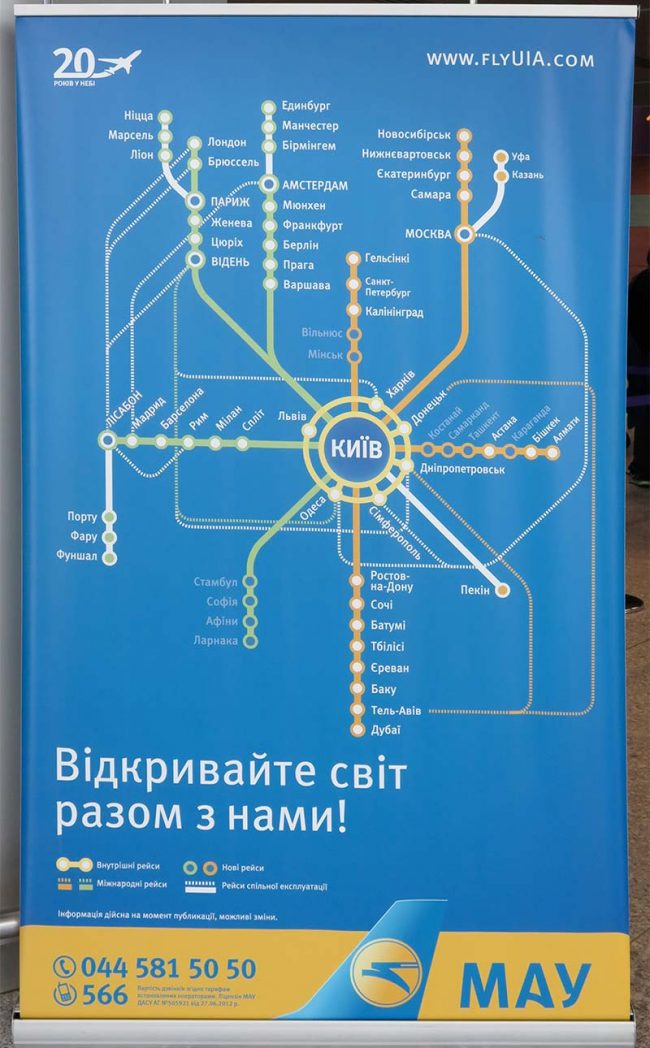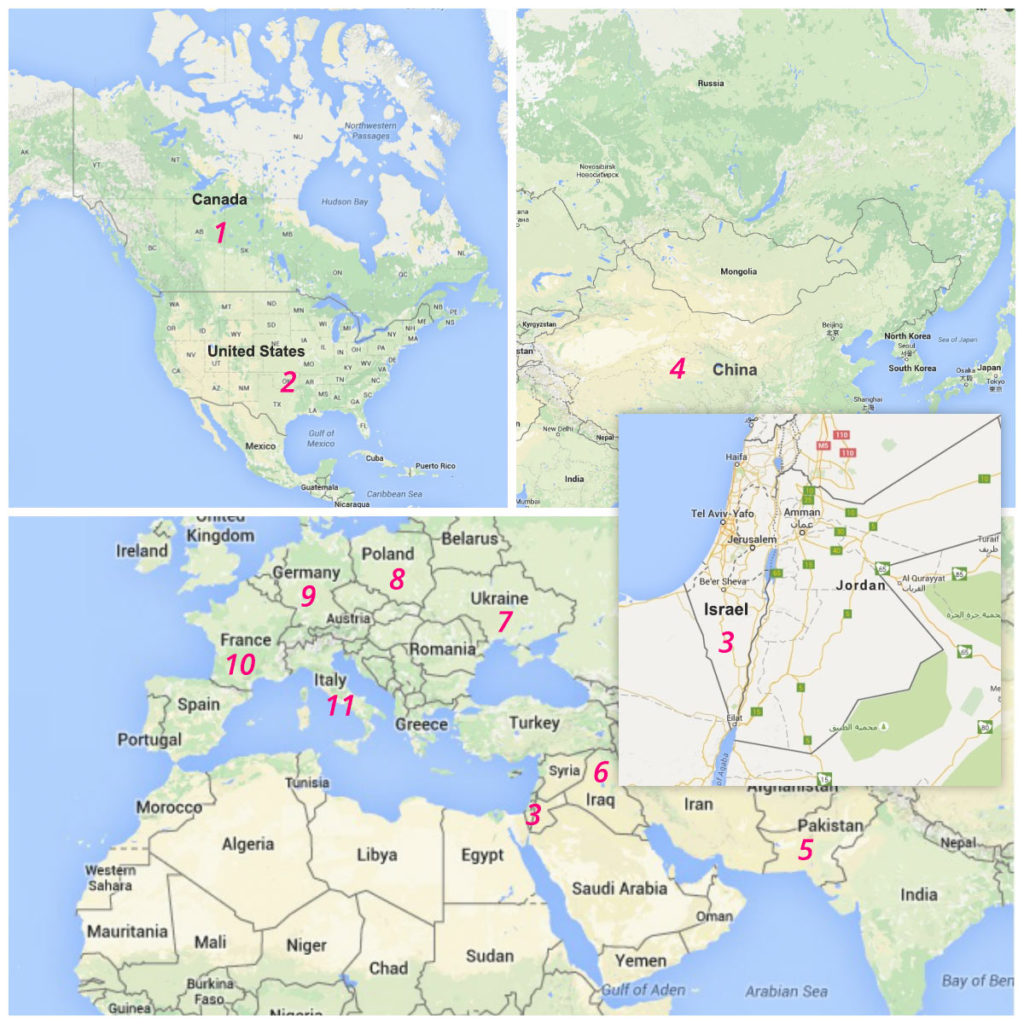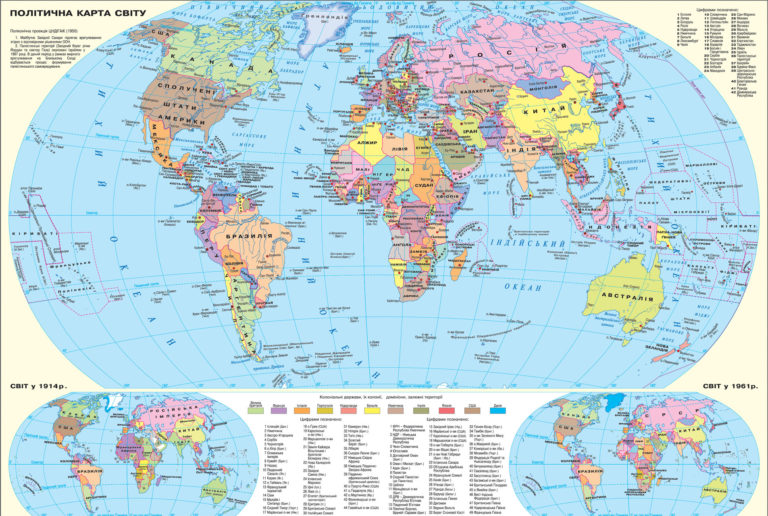ЗУСТРІЧ 3.1
Світ навколо мене
In this meeting, you will learn:
- nouns in the nominative and genitive cases (geographical names)
- vocabulary (numbers 1-10, geographical names)
- to count from 1-10
- to tell and ask where people are from
How do you say these numbers in Ukrainian?

How well can you count?
Count from 1 to 6
Count from 3 to 8
Count from 5 to 10
Count from 2 to 7
Count from 4 to 9
Let’s play Bingo! Study the Bingo card. Listen to your instructor and cross out the numbers on your sheet as you hear them. When you complete a row or a column, loudly say “Bingo!”
Match the countries in the table with the numbers on the map.
| Канада | Україна | Польща | Китай | Ірак |
| Італія | Франція | Пакистан | Ізраїль | Німеччина |
| США (Сполучені Штати Америки) | ||||
a Work with your partner. Study the map and create two lists: (1) the countries you have visited, and (2) the countries you would like to visit. Click on the map to enlarge it.
a Listen to the dialogue. What are the names of the two friends? [S3-1]
b Fill in the blanks in the dialogue with the phrases below.
Божена
це
Дуже приємно
Як справи?
![]() oднокурсниця = classmate (female)
oднокурсниця = classmate (female)
однокурсник = classmate (male)
Олена: Привіт! (1) .
Тетяна: Непогано, дякую! Олено, (2) моя подруга Божена. Вона моя однокурсниця.
Олена: (3) , Олена.
Божена: Приємно познайомитися, (4) .
Тетяна: Божена з Польщі.
Олена: З Польщі? А звідки саме? З якого міста? З Варшави?
Божена: Ні з Кракова. А ти з якого міста? З Києва, як і Тетяна?
Олена: Ні, я не з Києва. Я з Одеси.
c Listen to the dialogue once again and check your answers. [S3-1]
d Which geographical names are used in this dialogue?
Listen and repeat after the recording. [S3-2]
Geographical Names in the Genitive Case
| Feminine nouns Nominative ⟶ Genitive |
Masculine nouns Nominative ⟶ Genitive |
|---|---|
| Канада ⟶ з Канади | *Пакистан ⟶ з Пакистану |
| Україна ⟶ з України | Ірак ⟶ з Іраку |
| Німеччина ⟶ з Німеччини | Китай ⟶ з Китаю |
| Варшава ⟶ з Варшави | Парагвай ⟶ з Парагваю |
| Одеса ⟶ з Одеси | Ізраїль ⟶ з Ізраїлю |
| Мексика ⟶ з Мексики | **Київ ⟶ з Києва |
| Австралія ⟶ з Австралії | Львів ⟶ зі Львова |
| Франція ⟶ з Франції | Харків ⟶ з Харкова |
| Італія ⟶ з Італії | Краків ⟶ з Кракова |
| Париж – з Парижa / Парижу | |
| Польща ⟶ з Польщі | Берлін ⟶ з Берлінa / Берліну |
** Masculine nouns that denote names of Ukrainian and Slavic cities, normally take endings -а, -я. Foreign cities take endings either -у, -ю (but occasionally -а, -я endings are also accepted).
Read the dialogue in Вправа 7 once again and answer the following questions.
![]() Звідки? = Where from?
Звідки? = Where from?
З якого міста? = From which city?
- Звідки Божена? З якого вона міста?
- Звідки Тетяна? З якого вона міста?
- Звідки Олена? З якого вона міста?
- Звідки ти? З якого ти міста?
a Work collaboratively. Prepare dialogues similar to the one in Вправа 7 above.

Read the card with your new identity. Walk around the class and talk to your classmates, following this pattern.
- Привіт! Як тебе звати?
- Мене звати Петро Козачук.
- Звідки ти?
- Я з України.
- З якого ти міста?
- Я з Полтави. А ти?
from + country/city
(Я з України, з Києва)
| Country / країна | City / місто | ||
|---|---|---|---|
| Feminine | Masculine | Feminine | Masculine |
| з України | з Пакистану | з Полтави | з Парижа |
| з Канади | з Китаю | з Варшави | з Пекіна |
| з Німеччини | з Ізраїлю | з Єрусалима | |
| з Польщі | з Ісламабада | ||
| з Франції | з Києва | ||
| з Едмонтона | |||
| зі Львова | |||
| з Берліна | |||
| з Ужгорода | |||

